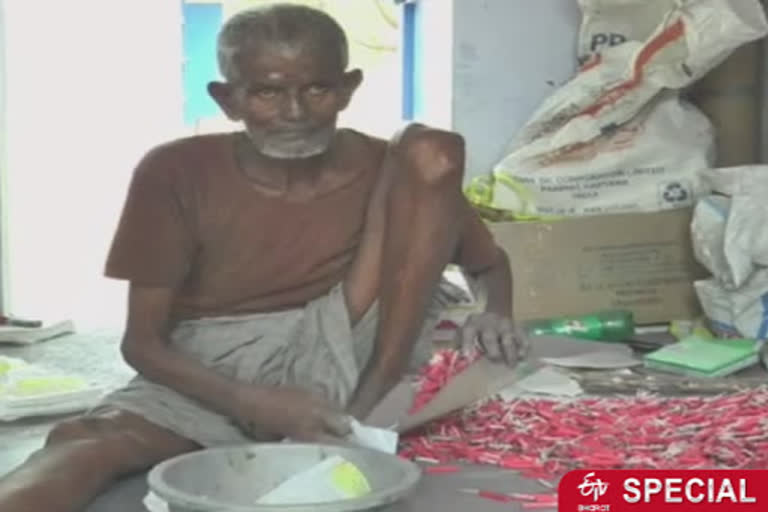Virudhunagar (Tamil Nadu): Crackers or fireworks are part and parcel of Diwali and Sivakasi, a town in Tamil Nadu's Virudhunagar district as the first Prime Minister of India Jawaharlal Nehru called this arid town as “Little Japan” comes to mind when one thinks of fireworks or crackers.
The town came to be known as 'Little Japan' because the people here are as active as the Japanese in East Asia.
The city abuzz as the manufacturing hub of matches and fireworks is also famous for printing works as well.
After their stint with matches, Sivakasi started growing as fireworks hub of the country as early as 1925 when the Sivakasi based industrialist Ayya Nadar and his relative Shanmuga Nadar established their fireworks manufacturing units in the town.
The arid climate void of moisture and abundant manpower due to failing agriculture in the region greatly aided the fireworks industry. Soon, Sivakasi grew into the fireworks hub of the country controlling anywhere between 70 to 80 per cent of the country's entire fireworks production.
Around 80 per cent of our country’s matchboxes and firecrackers are manufactured in Sivakasi at present.
As many as four lakh labourers are directly involved in the production while another four lakh workers are indirectly involved in auxiliary industries to fireworks.
Throughout the year, apart from the monsoon season, Sivakasi is engaged in manufacturing crackers and fireworks.
Fireworks and crackers are manufactured using aluminium powder, sulphur, nitrates and other chemicals.
Around 400 types of crackers are produced in as many as 1,100 factories in Sivakasi. Even though the crackers that are manufactured here are not at the forefront of exports, the domestic markets are booming with sales.
Although the production of firecrackers has been relatively smoother due to the relaxations that are implemented amidst the lockdown, only 60 per cent of the firecrackers have been produced compared to last year’s production.
Although the sale is not as expected, manufacturers are hoping to gain this festive season.
While the manufacturers were waiting for the response of their plea that would enable them to sell the crackers if they are allowed to keep their shops opened in the night too, the ban on firecrackers in states like Rajasthan, Odisha and Karnataka came as a blow to them.
About 8 lakhs people including workers, including firecracker, manufacturers, sellers and distributors will be severely affected due to this ban.
Ganesan, the President of the Tamil Nadu Fireworks Manufacturers’ Association said that the announcement of the ban for the use of firecrackers by Rajasthan government was shocking and added that the firecrackers are manufactured only by using chemicals that are approved by the central government.
"We have manufactured green crackers adhering to the formula approved by Council of Scientific & Industrial Research - National Environmental Engineering Research Institute (CSIR-NEERI) and Petroleum and Explosives Safety Organisation (PESO)," he added.
Virudhunagar MP Manikkam Tagore and DMK Chief Stalin have also written to the Chief Minister of Rajasthan to reconsider the imposition of the ban of crackers in the state.
In Tamil Nau, the firecrackers industry usually trades to the tune of 4 to 5 thousand crores of rupees a year.
In the last four years, the production of firecrackers has fallen by about 50 per cent due to the crisis, including the import of Chinese firecrackers, a 28 per cent GST levy and a ban on the fireworks in Delhi due to air pollution.
Due to this, there is a commercial loss of about Rs 2,500 crores. At this juncture, the ban imposed by the states of Rajasthan, Odisha and Karnataka has further put the livelihoods of those who depend on firecrackers factories at stake.
Fireworks manufacturers say that normally the orders from other states start coming three months prior to Diwali but this year there is no order even from other states.
Considering the fact that more than 8 lakh people depend on the firecracker industry, the central and state governments need to take immediate actions.
It is noteworthy that the Chief Minister of Tamil Nadu has written a letter to the respective states in this regard.
Also Read: Ban on firecrackers, COVID-19 hits fireworks industry in TN hard



